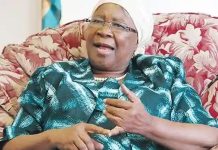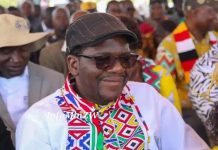Independence, the Matabeleland massacres, land reform, and despotism: These words have come to encapsulate the 60-year-long political career of former Zimbabwean President Robert Mugabe, who died this month aged 95.
The promising young student taken in by Jesuit missionaries always preferred the company of books to his classmates. Politics, however, was where Mugabe would eventually make his mark. Fighting for independence, stewarding a new nation to maturity and then running it into the ground, Mugabe always drew the interest and consternation of the world’s press. Now, at long last, the figure known simply as “The Old Man” has met the fate that he eluded for so long and has been laid to rest amid both adoration and controversy.
Zimbabwe has always been an anomaly. Well into the second half of the 20th century, the country still bore the name of mining magnate Cecil Rhodes, who established a British colony there. Where young African nations reveled in their newfound independence and statehood, Zimbabweans lived in a country that was ruled by the 8 percent of the population that was white. In this environment, two groups vied to change the status quo: Joshua Nkomo’s African People’s Union (ZAPU) and the rival Zimbabwe African National Union (ZANU) founded by Mugabe. The Patriotic Front (PF) was formed as a political and military alliance between ZAPU and ZANU. Infighting with Nkomo and detention at the hands of white jailers from 1964 to 1974 changed who Mugabe was. The studious and erudite young African teacher grew into a shrewd and calculating guerrilla leader. To many biographers, the denial of Mugabe’s request to bury his eldest son, who died while he was in prison, was the most formative moment during his early political life.
Upon his release, the incredibly loquacious Mugabe quickly became the driving force within the PF and London began to take notice of his status, negotiating independence directly with him. Appearing courteous and responsible, Zimbabwe’s outgoing white leader Ian Smith was reassured that the new nation would not descend into the despotism of nearby Zaire and Angola. In his address to the new nation, Mugabe hoped that “peace and stability can only be achieved if all of us, first as individuals and secondly as part of the whole Zimbabwean national community, feel a definite sense of individual security on the one hand and have an assurance of national peace and security on the other.” Zimbabweans had achieved what had once seemed impossible and Mugabe, the man who was robbed of a decade of his life, shook hands with his former captors in a spirit of reconciliation years before Nelson Mandela’s memorable rise to power in South Africa.
In the following years, however, his leadership took on a new direction. Ever suspicious of Nkomo’s heritage as part of the historically turbulent Ndebele population, Mugabe made a speech in 1982 claiming: “ZAPU and its leader, Dr. Joshua Nkomo, are like a cobra in a house. The only way to deal effectively with a snake is to strike and destroy its head.” A political and ethnic witch-hunt ensued and the Gukurahundi massacres in Nkomo’s Matabeleland homeland left 20,000 civilians dead, as Mugabe attempted to destroy ZAPU and create a one-party state.
The world looked the other way and Mugabe, a lifelong Anglophile, took tea with Margaret Thatcher at Chequers, talked cricket with John Major and was knighted by Queen Elizabeth II. Zimbabwe’s relative stability in respect to its neighbors and its supplies of platinum, diamonds and gold allowed Mugabe to continue to court Western support while consolidating power at home. Though professing an adherence to Marxist theory, the government focused on conservative economic development with some notable successes. The administration expanded health care and education — in 1980, Zimbabwe had 177 secondary schools, but within two decades this number had risen to almost 2,000. During the same period, the adult literacy rate rose from 62 percent to 82 percent, one of the best records in Africa.
However, Zimbabwe’s new masters never truly discarded their guerilla tactics. Following the Matabeleland massacres, Mugabe held onto power through increasingly unfair elections and thuggery. The prime minister quickly became president and corruption and mismanagement seeped into the ruling party. The government of Zimbabwe became the “regime” in international discourse. Having once pledged racial reconciliation and included white ministers in his government, Mugabe’s defense of torture and contempt for legal procedure damaged his prestige and, within three years of his premiership, half of all white Zimbabweans had fled.
During the 1990s, Zimbabwe’s economy deteriorated. When Mugabe came to power, Tanzanian President Julius Nyerere told him: “You have inherited a jewel. Keep it that way.” By the year 2000, wages, life expectancy and general living standards were all below their level at independence. HIV and AIDS grew exponentially amid the chaos, with one out of every five adult Zimbabweans living with the infection. Eager for a scapegoat, the regime put a policy of land redistribution at the center of its agenda, encouraging the violent seizure of white farms. Food production was severely impacted and unemployment skyrocketed; hyperinflation took hold and the greater part of the nation’s workforce emigrated.
The increasingly frail Mugabe watched as his wife Grace maneuvered to inherit the presidency. In 2017, military leaders intervened. Their stated objective was telling of Mugabe’s iconic status within Zimbabwe despite its sorry state: They were working to defend the founding father’s legacy from those who would seek to destroy it. In death, however, this showed itself to be a wasted legacy.
Mugabe’s remains were repatriated to a struggling country suffering with power cuts of up to 18 hours per day, where doctors earn $90 a month. Many Zimbabweans, ever coy, claimed that they had attended Mugabe’s lying-in-state simply to check that he had actually passed away. As the ruling party desperately tried to use the event to link the current regime to the struggle for independence, it is clear that a population whose average age is 18 will demand real solutions and opportunities as opposed to tales of armed struggle.
Zaid M. Belbagi is a political commentator, and an adviser to private clients between London and the Gulf Cooperation Council (GCC). Twitter: @Moulay_Zaid






